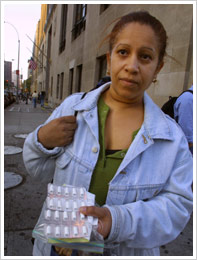 |
|
Some members of the media became cheerleaders for the Bush administration and Congress in the wake of the terrorist attacks. |
|
During times of major crisis, particularly those crises concerning foreign policy, it is quite natural for political actors and the news media to take a softer stand on presidents. The role of the president in such situations becomes primarily that of a crisis manager. However, that softer stand does not generally mean that the media abandon all criticism. Rather, they become much more reluctant to express criticism of the president, the administration, or Congress while these leaders are trying to handle the particular crisis.
 |
|
| Luz Rodriguez, a mail processor for the U.S. Postal Service in New York City, left work on October 25 with a 10-day supply of Cipro. An antibiotic known to help fight the effects of anthrax exposure, Cipro was offered on a voluntary basis to the 7,000 postal employees who work in midtown Manhattan facilities. AP / Wide World Photos |
|
The media lost their balance in the wake of horrific terrorist attacks and lost their primary role as a watchdog of government. Nobody expected or desired the media to be an attack dog in such a situation. As I previously mentioned, much of the public had become disillusioned with the media because of their prior attack-dog stance. In the long run, however, the public is better served by a watchdog than by a cheerleading media. The House of Representatives decided to stop all work when the first anthrax spores were discovered in its offices—before anyone had become infected. At the same time, government officials told the public not to worry. Similarly, postal workers were told by health officials and by officials of the postal service to continue going to work, even though anthrax had been found in postal facilities in New Jersey, New York, and Washington. There was no outcry in the media about Congress closing down, but postal employees had to keep working. I think that silence represented a great lapse in the watchdog role of the media.